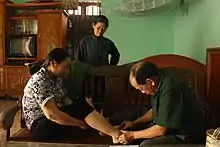Ngái people
The Ngái (Vietnamese: Người Ngái; Chữ Nôm: 𠊛𠊎) are a Hakka-speaking community in Vietnam and other nearby countries of Indochina, whose ancestors were Southern Chinese.[4] The Vietnamese government separated Ngai from Cantonese when considering ethnic minority groups.
 Ngái people doing moxibustion in Province Thái Nguyên | |
| Total population | |
|---|---|
| 4,841 (1999)[1] 1,035 (2009)[2] 1,649 (2019)[3] | |
| Regions with significant populations | |
| Vietnam: Quảng Ninh, Thái Nguyên, Hải Phòng | |
| Languages | |
| Hakka Chinese, Mandarin Chinese & Vietnamese | |
| Religion | |
| Mahayana Buddhism | |
| Related ethnic groups | |
| Hakka people, Chinese Vietnamese, Tanka people |
According to Vietnamese sources the Ngái people speak Hakka, a Sino-Tibetan language but are classified separately from the Hoa or urban ethnic "Overseas Chinese". The Ngái population was 4,841 in 1999[1] but down only 1,035 in 2009 and up to 1,649 in 2019.[2][5][3]
See also
References
- Official data from census of 1999, file 27.DS99.xls
- Tổng điều tra dân số và nhà ở Việt Nam năm 2009: Kết quả toàn bộ. Hà Nội, 6-2010. page 134-225.
- "Report on Results of the 2019 Census". General Statistics Office of Vietnam. Retrieved 1 May 2020.
- "Người Ngái" [Ngái people]. Viet Nam Government Portal (in Vietnamese). 2015. Archived from the original on 2014-01-22. Retrieved April 2, 2018.
- "Ngái in Vietnam". Vietnam Tourism. Retrieved March 31, 2018.
This article is issued from Wikipedia. The text is licensed under Creative Commons - Attribution - Sharealike. Additional terms may apply for the media files.